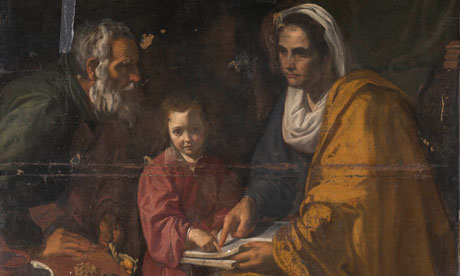My friend heidenkind recently brought my attention to this article, which asserts that The Education of the Virgin (17th century, shown right), a painting discovered in the basement of Yale Art Gallery, is not by Velasquez (as was thought earlier this year). I have to admit, I was pretty pleased that the painting was unattributed to Velasquez. Is that strange? I would assume that most people are thrilled when they learn that a possible new work by Velasquez, da Vinci, Michelangelo, etc., has been discovered. And I rarely (if ever) feel thrilled about such news - particularly if the work has immediately been attributed to a great master. Instead, I get pleased when the painting is demoted from any "great master" status.
Lately I've been trying to figure out why I feel this way. Some of you may remember me earlier post along these lines, in which I discussed my skepticism on the plethora of new discoveries. I haven't quite pinpointed all of the reasons for my skepticism/hesitation regarding new discoveries, but I thought that writing this post might help me to organize my thoughts. I think that I mostly resist hasty attributions to great masters because I know a little bit about the politics behind art attribution - it's tempting for a connoisseur to attribute a painting to a great master, since such an attribution would help further the publicity and career of that connoisseur. I'm particularly reminded of Abraham Bredius, the connoisseur who "discovered" the "Vermeer" paintings by the forger Han Van Meegeren. Bredius is lucky that he passed away soon after Van Meegeren's confession in 1945.
Anyhow, there are lots of other motivations for a work of art to be attributed to a great master, and most of them are financial. The owning museum, institution, or gallery will push for such an attribution, since it will be monetarily beneficial. And hey, the connoisseur could also get a nice fat check for such an attribution.
But is this political/financial reason why I don't get excited about discoveries? I also wonder if my might have something to do with the historian side of me. If there are unknown works by great masters, then this forces me (as a historian) to reshape the artist in my mind as a historical figure. And I think I resist such reshaping a little bit. Does that make sense? In some ways, I feel like I know great artists quite well, and having a new work of art means that there is some aspect to their lives and work that was hidden from me. (I guess it's kind of like the artist was doing something "behind my back.") I know, it's a little silly. Yet, at the same time, I love learning new things about artists. So maybe I experience some kind of inward struggle (i.e. the desire to learn vs. feeling deceived) when a new work of art is discovered, and that's why I shy away from such discoveries. I don't know.
Ironically, though, I rarely feel skeptical when archaeologists announce that a new work of prehistoric/ancient art was discovered or excavated. I always think, "Hey, awesome!" and move on with my life. So my skepticism (and emotional attachment?) must be somehow related to the idea that these works of art are attached to early modern "masters" (i.e. individuals). There isn't enough information about specific prehistoric/ancient artists (or even some cultures!) for me to get as defensive and protective as a historian. Instead, I almost always get excited about ancient discoveries.
So, that's what I came up with this evening: political/financial reasons and my silly protectiveness as a historian prevent me from embracing new "masterpieces." What about you? Am I the only person who is continuously skeptical? Do most people get excited about attributions and "masterpiece" discoveries? Do any other historians get protective about an artist's biography/oeuvre?
